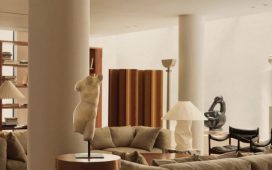[ad_1]
I met this woman in Machina, in Yobe state, when I was on assignment in northern Nigeria 2020. It had taken us seven hours to get there – it’s right on the border with Niger – and it was already late afternoon, early evening.
We were waiting for people to come and collect water from a solar-powered water pump when I saw her: this extremely beautiful Fulani woman. I was particularly drawn to the marks on her face. I knew Fulani women always like to look good, but it was really beautiful to see up close. There was a bit of a language barrier as I don’t speak Fula and she didn’t speak English or Hausa, but she agreed to have her photo taken.
Because it was 5.30–6pm, the light was soft and although it was a very hot region close to the desert – I remember at the end of the trip a lot of dust had got into my camera – it wasn’t too hot. I just needed to find the best spot, where the light wasn’t too harsh but was just enough to highlight her skin and bring out the features of her face. We were surrounded by people, lots of children: they were looking and smiling.
Sign up for Her Stage to hear directly from incredible women in the developing world on the issues that matter to them, delivered to your inbox monthly:
Sign up for Her Stage – please check your spam folder for the confirmation email
One of the things that occurred to me recently was that, as a photojournalist, I am a timekeeper. Because every time that I click, I’m recording a moment that can never come back. I’m freezing a particular time that can never recur.
When I saw this woman I felt: she is too beautiful not to be photographed! But it’s not just about the aesthetics. It’s also about capturing her in that moment, and preserving it; saying that this particular tribe, or these people, used to live in Machina, and even if that might change in years to come at least I have this document, this visual proof, to show that this person was there, that these people existed. That’s the part of me that wants to document my country, to build an archive of images.
It’s not always straightforward: Nigeria is a big place and I do a lot of travelling. Sometimes people cannot understand it. One of the things I get told is: “You mean to say that as a woman you just travelled to come and take pictures? How is that possible?” Sometimes people genuinely think I must have an ulterior motive. Most are very welcoming, but there will be one or two people who continue to question. But I make sure that I’m as transparent as possible. I say, look on my website. This is my homepage. This is how the images are used. I’m not a spy!
Etinosa Yvonne was speaking to Lizzy Davies. Yvonne, 32, is a self-taught Nigerian documentary photographer and visual artist based in Abuja. The primary focus of her work is the exploration of themes related to the human condition and social injustice
[ad_2]
READ SOURCE


